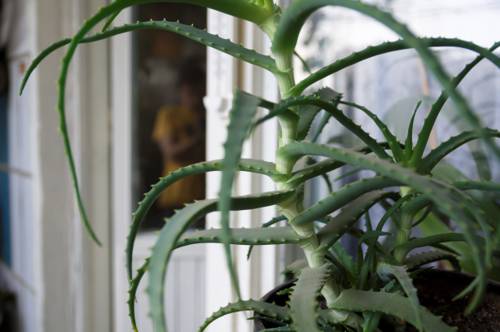
FAQ About Indoor Plant Phytochemical Properties

What are phytochemicals in indoor plants?
Phytochemicals are naturally occurring compounds in plants that contribute to their color, flavor, and resistance to diseases. In indoor plants, these compounds can include flavonoids, terpenes, and alkaloids, among others.

How do phytochemicals benefit indoor air quality?
Phytochemicals in indoor plants can improve air quality by serving as natural air purifiers. Some compounds can absorb pollutants such as formaldehyde and benzene, effectively reducing toxins present in indoor air.

Which indoor plants are known for their phytochemical benefits?
Indoor plants such as spider plants, peace lilies, and rubber plants are known for their ability to produce beneficial phytochemicals that help clean indoor air and contribute to a healthier living environment.

Can phytochemicals from indoor plants improve mental health?
Yes, some phytochemicals in indoor plants are believed to have mood-enhancing properties. The presence of indoor greenery can reduce stress and anxiety, potentially linked to the soothing effects of certain phytochemicals released by these plants.

How do phytochemicals in indoor plants affect ecology?
The phytochemicals in indoor plants can influence indoor ecology by promoting beneficial microbial communities. These compounds can also affect pest control by repelling insects naturally.

Are there phytochemicals that can be harmful when released indoors?
Most phytochemicals released by common indoor plants are harmless or beneficial. However, certain compounds can cause allergic reactions in sensitive individuals. It's important to research plant species and understand their properties before bringing them indoors.

Do all indoor plants produce beneficial phytochemicals?
Not all indoor plants produce significant quantities of beneficial phytochemicals. The extent varies with the species and environmental factors such as light and humidity.

Can indoor plant phytochemicals act as natural pesticides?
Yes, some indoor plants emit phytochemicals that act as natural pesticides, deterring insects and other pests without the need for chemical interventions. For example, plants from the mint family can repel mosquitoes and flies.

What role do terpenes play in indoor plant health benefits?
Terpenes are a class of phytochemicals found in many indoor plants. They are known for their aromatic properties and can help reduce stress and anxiety. Additionally, terpenes may contribute to pest resistance and enhance the plant's overall health.

Are there specific conditions that enhance phytochemical production in indoor plants?
Phytochemical production in indoor plants can be influenced by light, temperature, and humidity. Providing optimal growing conditions can enhance the synthesis of beneficial compounds, making plants more resilient and effective air purifiers.

How do I know if my indoor plant is producing phytochemicals effectively?
Visible signs of healthy growth, such as vibrant leaves and strong stems, indicate effective phytochemical production. Additionally, the absence of pests and a noticeable improvement in air quality can suggest that your plant is producing beneficial compounds.

Is it possible to extract phytochemicals from indoor plants for personal use?
While it is technically possible to extract phytochemicals from indoor plants, it generally requires specialized knowledge and equipment. For home use, the best way to benefit from these compounds is to keep the plants healthy and thriving.

Can indoor plant phytochemicals boost immunity?
Indirectly, yes. The improvement of air quality and reduction of stress due to indoor plants can contribute to better immune function. However, more research is needed to directly link specific phytochemicals to immune boosting.

Do phytochemicals in indoor plants degrade over time?
Phytochemicals can degrade over time, especially if the plant is not kept in optimal conditions. Factors such as light exposure, water levels, and soil health all contribute to the lifespan of phytochemicals within the plant.

What are flavonoids, and how do they work in indoor plants?
Flavonoids are a group of phytochemicals found in many plants, known for their antioxidant properties. In indoor plants, they help protect against UV rays and pests while also contributing to air purification.

How can I maximize the phytochemical output of my indoor plants?
To maximize phytochemical output, ensure that your indoor plants receive adequate sunlight, are watered correctly, and are grown in nutrient-rich soil. Regularly check the health of your plants and adjust care routines as needed.

Are there phytochemical differences between indoor and outdoor plants?
Yes, the environment significantly affects phytochemical production. Indoor plants may produce different types or amounts of phytochemicals compared to outdoor plants due to differences in light exposure, climate control, and interaction with the ecosystem.

Can phytochemicals from indoor plants help reduce allergens?
Some indoor plants release phytochemicals that reduce allergens by trapping airborne particles and improving air quality. However, individuals with specific plant allergies should be cautious when choosing indoor plants.

Can consuming parts of indoor plants provide health benefits?
While some indoor plants can be consumed safely and provide health benefits, caution is advised. Not all indoor plants are edible or safe to consume, and care should be taken to ensure the plant is not toxic.

How do phytochemicals affect the fragrance of indoor plants?
Phytochemicals like terpenes are primarily responsible for the fragrance of indoor plants. These natural scents can have calming effects, enhance mood, and improve the ambiance of indoor spaces.
